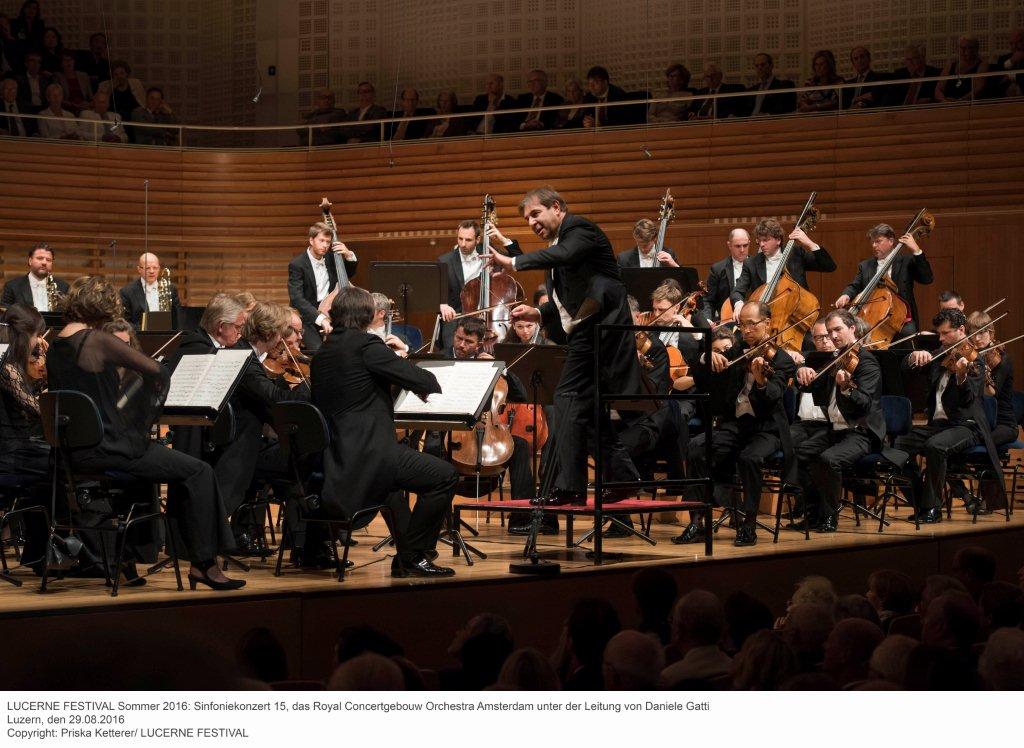 Switzerland Lucerne Festival (4) – Weber, Schumann, Bruckner: Royal Concertgebouw Orchestra Amsterdam, Sol Gabetta (cello) / Daniele Gatti (conductor). Kultur- und Kongresszentrum Lucerne, 29.8.2016. (JR)
Switzerland Lucerne Festival (4) – Weber, Schumann, Bruckner: Royal Concertgebouw Orchestra Amsterdam, Sol Gabetta (cello) / Daniele Gatti (conductor). Kultur- und Kongresszentrum Lucerne, 29.8.2016. (JR)

Weber: Overture to Oberon
Schumann: Cello Concerto
Bruckner: Symphony No. 4 (“Romantic”)
Daniele Gatti has now commenced his tenure as Music Director of the prestigious Concertgebouw and brought his new orchestra to the Lucerne Festival for two concerts; the first included works by Debussy, Dutilleux, Saint-Saëns and Stravinsky. I caught his second concert which followed the traditional but nowadays surprisingly uncommon concert programming of overture, concerto and symphony.
The overture was to Weber’s opera Oberon; the opera is now seldom performed but the effervescent overture remains a concert-hall favourite. Immediately apparent were the silky strings of the Concertgebouw. Gatti whipped up a frenzy to show how fast and securely his string section could play. The joyful piece also showed off the talents of a very golden clarinet.
The Schumann Cello Concerto is not a particularly popular work and in the first movement it had difficulty holding my attention. It was never performed during Schumann’s lifetime and perhaps he would have revised it, had he heard it in concert. The first movement is, to my mind, too long-winded and seemingly disjointed; my neighbour nodded off. Sol Gabetta did her best with it, but her heart wasn’t in it. The slow movement is short but very beautiful and here the tone of Gabetta’s instrument (a Giovanni Battista Guarneri from 1759) shone through and kept the audience rapt. The third movement finally displays some of the exuberance evident in Schumann’s symphonies, although the ending is rather sudden and restrained. The orchestra soft-pedalled throughout to allow Gabetta’s sound to fill the large hall. Gabetta’s technical prowess was most evident in the two charming encores she chose: one is a regular favourite of hers, Pablo Casals’ “Song of the Birds”, gentle and searching, reminding me in one section of Bruch. The second encore was by Latvian composer Peteris Vasks, entitled “Dolcissimo” (from “Gramata Cellam”) starting with insect noises, a trembling and sliding left hand conjuring up weird and wonderful sounds, complemented by Gabetta’s wordless singing. Gabetta mastered the major technical challenges with an extraordinary lightness of touch. I could have done without the Schumann and just had a few more encores.
Gatti’s Mahler is by now a known (and excellent) quality but his Bruckner, to my mind, is not yet in the same league. He chose rather slow speeds throughout, with decidedly mixed results. He also, sadly, dampened the decibels for much of the symphony. This meant the quieter passages were particularly tender; the slow speeds certainly opened up the work to detailed aural inspection. No doubt this was a very beautiful reading but the work has its flaws (it was subject to many revisions by the composer – Gatti gave us the Nowak edition, from 1878/1880) and these flaws come to the fore when the work loses rhythmic momentum. Gatti is quite an earthbound conductor, his feet never leave the floor, and his baton style is solid and exact. The performance brought back memories of Sergiu Celibidache’s painfully slow Bruckner with the Munich Philharmonic at the Gasteig, and they were not pleasant memories.
The orchestra, of course, is a sonic delight and a wonderful band of players, though the horn section surprisingly did not have the securest of evenings. No roars, no standing ovation, but Gatti has made a solid and respectable start.
John Rhodes
